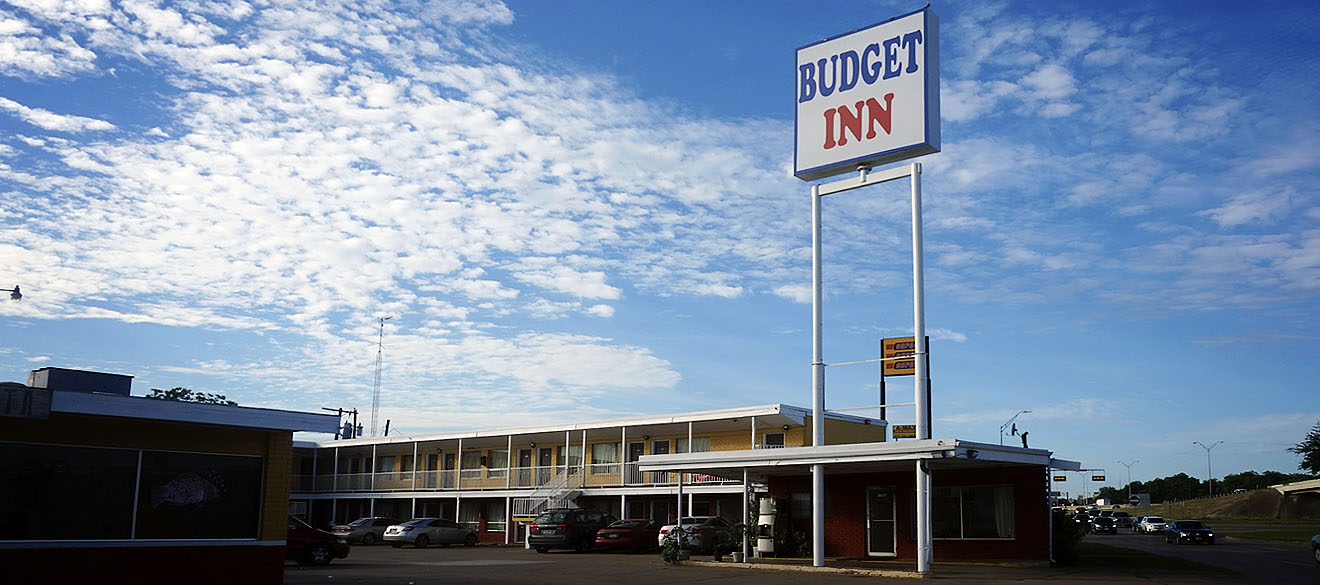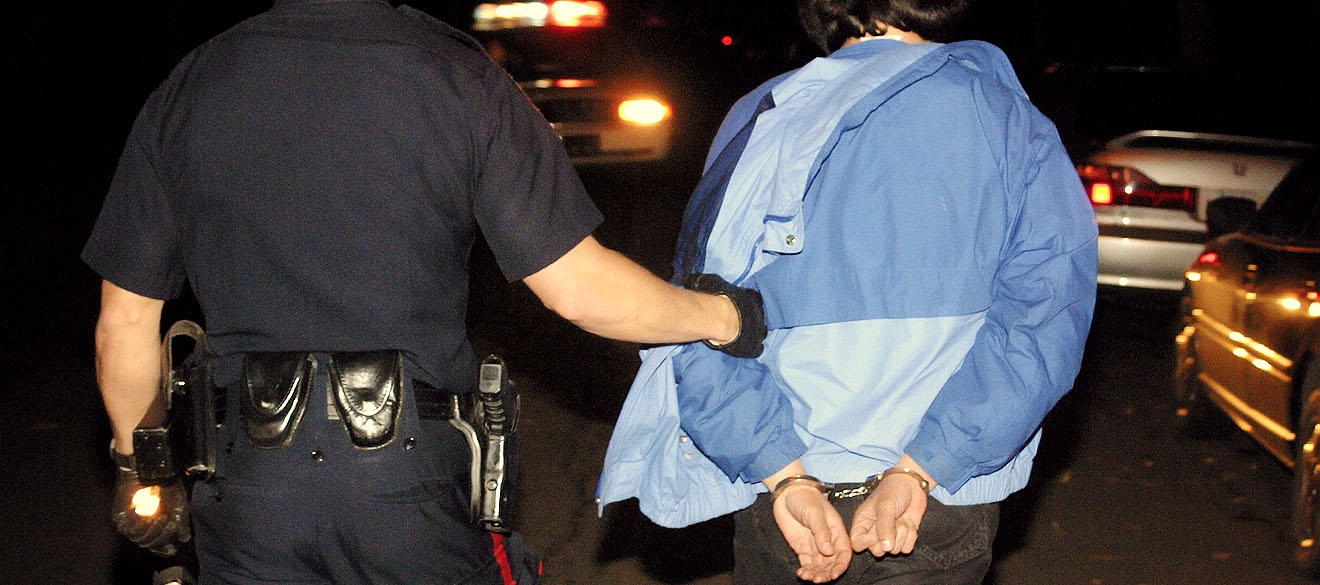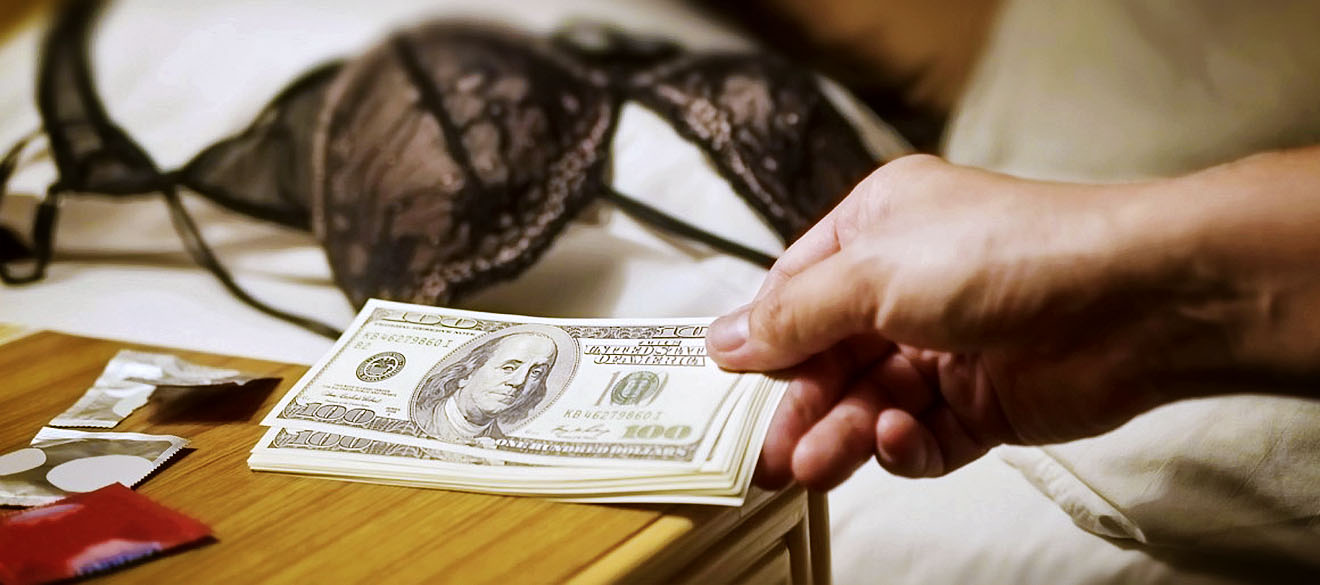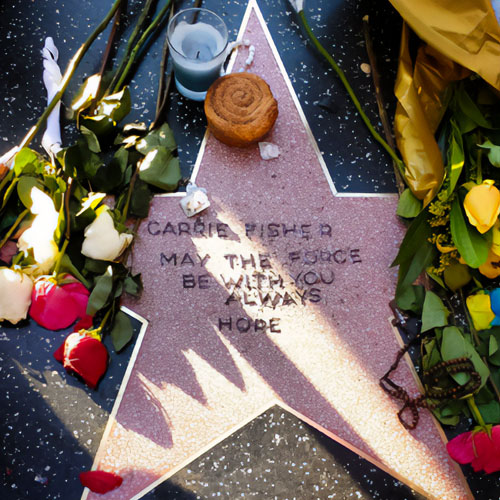I’m in Brazos County, Texas, in a roadside motel room colored by the soft light of “Bowhunter” on the TV and a collection of police-issue iPhones.
“I know what the eggplant emoji is,” says one of the detectives in the twin-bed room, referring to an oft-used sexting symbol, “but do we know if the prosecutors will take it as an agreement for sex?”
As we wait, they give me a chance to write my own guesses on the operation whiteboard: the number of johns they’ll bust today, and of those busted, how many will cry, possess drugs, carry unlicensed guns, and have outstanding warrants. But before I finish, I’m interrupted by cheering plain-clothed officers. Bowhunter’s Mike Carney has nailed a musk ox in the heart.
“He’s coming,” crackles a police radio moments later, and the room comes alive.
I follow the officer in charge, Sergeant Paul Mahoney, into the bathroom, where he and his largest officer strap on their gun holsters and select a pair of handcuffs from a neat row. Two other detectives wait silently behind the hotel-room door, which is soon opened by a female cop, a tiny, bird-like woman in jeans and ill-suiting makeup, looking vaguely like the blurry online photo they posted offering her sexual services.
“Come in,” she says with a huge smile. The john puts his second foot inside the room and is jumped on and cuffed by four police officers.
Within seconds, I hear one of the officers mutter, “Fuck, he’s pissed himself.”
The other johns arrested that day would yell and struggle, or holler that they weren’t going to fight, but Fernando stands quietly as the cops search his pockets, his fear spreading across the front of his work trousers.
Gene, the male cop Fernando had been unwittingly sexting with, asks him why he’d been so stupid. In response, Fernando says softly, “I got to live with what happened,” his wet pants sticking to his legs. He goes on to calmly, politely answer questions about his wife, two jobs, and two toddlers back home.
Pissing himself will be the first in a series of humiliations for Fernando, and thousands of guys like him caught in john stings around the country. His mug shot, name, and engagement in “sex crimes” are splashed on the local news that evening, and will live on the internet forever. Fernando is another casualty in the war on sex, the fallout from a moral panic that is destroying lives in order to save them.
A week after Fernando’s arrest, I’m in a church basement in downtown Waco, Texas, with 11 more johns busted while attempting to procure sex. They avoid each other’s gaze, just as they avoid, even more carefully, the eyes of the man standing before them.
“This won’t be a hug-athon,” says Brett Mills, coordinator of an anti-prostitution program—a “john school”—to a field of lowered baseball caps. “We’re kind, but we’re not faint of heart.”
Mills has been running this john school—a mandatory education program for men convicted of first-time solicitation offenses—since 2014, part of the Jesus Said Love (JSL) not-for-profit organization he runs with his wife Emily.
Mills reads out the class rules: sleepers and phone checkers get one warning before being asked to leave. Same goes for anyone drunk, high, or late. Mills then instructs the johns to “own their story” by sharing how they were arrested, but without protesting their innocence.
Each john had to pay $525 for the privilege of attending this class, part of their misdemeanor charge for online solicitation of a prostitute. They were arrested during multiple police stings across several Texas counties. Of the johns in the room, seven are Latino and one is Asian; all eight are blue-collar workers. The three white guys are active-duty military personnel.
Brett Mills commands the room, smoothly shifting from cool youth-group leader to drill sergeant. Speaking forcefully, he says, “There are eight women in our [JSL] office right now that have been perpetrated on by guys like you!” JSL is primarily focused on helping “janes” leave the commercial sex industry, and its john schools, which teach that women should not be bought and sold, have become a core part of that mission. It doesn’t hurt that these schools have become a lucrative business and attract significant political support.
Unable to shrink any further inside himself, Tanner is called on to share his story. He’s a tall, thin, 24-year-old from suburban Dallas. While others fidget and down energy drinks, Tanner only clenches his fists around the sides of his T-shirt, his eyelids at half-mast.
“I just wanted to talk to a female face before being stuck in a box,” he says of the day he was arrested, mere hours before he was due to be deployed overseas. “I tried to call and got a text back. I thought it was weird, but I just wanted to see a woman. Then these two guys are comin’ at me. I tried to fight back; they didn’t ID as cops. There was no video or audio surveillance—it all seems kind of sketchy to me.”
Mills asks the johns who had their mug shots posted on local TV news. They all raise their hands. “And on Facebook, everyone saw it on Facebook,” Tanner adds quietly.
“I don’t give a fuck about your face on the news, I care about these women!” Mills barks, telling me later that he calls these “front-end alignment moments.”
If Mills had his way, the class would cost twenty times more so that the johns would feel the true weight of their crime. The average DUI costs in excess of $10,000 when impounding, fines, court, and attorney fees are taken into account. Even then, Mills says, the crimes are not equivalent: driving drunk is nothing like trying to buy a human being.
“And don’t tell me that legalization is the way to go,” he adds. “The only one who wins there are the regulators, ‘cause they get the money. Go to a bar and meet someone!”
Before we break for lunch, we meet Sheronda and Jackie, two of JSL’s presenters, who share stories and information. Some of what they relate is shocking. Sheronda used to rob johns, we learn. She ran away from home after being sexually abused by her stepfather and later used to pose as a prostitute and make off with would-be johns’ money and cars.
Jackie is a state health-department nurse, and wheels out a projector for a stomach-churning slideshow of the worst effects of untreated STDs in men and women. She offers free swabbings to the johns as they filter outside. Several of them complain they’ve lost their appetite for lunch.
A number of the guys share cigarettes and laughs, but I notice Tanner walking anxiously around the parking lot, painfully alone. He doesn’t want to talk about what happened, but soon the words rush out anyway. “I just want it all behind me,” he says. “I hope that this is the end.”
Tanner was arrested with 30 others in a sting at a motel near the Fort Hood military base. Local media ran his mug shot and a report that he was found in possession of a knife, six lengths of rope, duct tape, and a body bag. He told deputies he brought the rope to the room because he had a bonding fetish. The other items were found in his car later.
“There was no investigation,” Tanner says. “The sheriff told the media that I was a serial killer.”

Not long after talking to Tanner, I arrive at the Waco office of the McLennan County sheriff, Parnell McNamara. I’m here to talk to him and his human-trafficking team. Sheriff McNamara greets me with a hug and asks if I want anything to drink. Within minutes, I’m being shown a media highlight-reel of the sheriff’s greatest law-enforcement triumphs. When we’re done, he asks me to pose for photos with his collection of Tommy submachine guns, and hands me an autographed photo and merchandise promoting his reelection campaign, all of which carries the slogan, “Parnell’s Posse: 2020 Vision.”
“Some of these guys should have been shot,” the sheriff tells me. “Johns are the root of the evil, creating the demand. It’s a big effort—the pimps, the johns, the molesters are all in it together.” Sheriff McNamara pauses and asks me to write down the following quote: “Child molesters should be tied to a post and horse-whipped every day.”
Moving on to a gateway theory of what johns involve themselves in, Sheriff McNamara argues that soliciting women is like the marijuana of sex. “I think prostitution leads to child molestation,” he continues. “[Johns] get bored and escalate to something weirder, kinkier.”
* * *
Sheriff McNamara describes himself as a lawman who “just inherited the job.” His family on his father’s side had been Waco law-enforcement mainstays going all the way back to 1902. His office is a shrine to three generations of the badge—one cabinet alone holds 17 framed photographs and seven guns beneath a scales of justice.
He is something of a Waco legend, Parnell McNamara. That’s what happens when you do things like form a posse of old-school lawmen to track down a thief dumb enough to steal a horse belonging to your daughter. That much-publicized event took place in 1996. More recently, the 70-year-old sheriff was cited as the inspiration for Jeff Bridges’ character Marcus Hamilton in the 2016 Academy Award-nominated film Hell Or High Water. Bridges plays an ornery U.S. marshal not ready to face mandatory retirement at age 57—which is exactly what happened to McNamara after 30-plus years as a Texas deputy marshall.
“You gotta get the right-lookin’ hat,” McNamara told Bridges, who shadowed the Stetson-loving sheriff to prepare for his role. “If you get a stupid hat, you’ll wind up lookin’ like Howdy Doody.”
To seal their friendship, McNamara “put him in the posse,” making Bridges an honorary deputy sheriff, before traveling with the actor to the Oscars, an experience he recalls almost as fondly as he recounts tales of his law-enforcement career.
McNamara hasn’t visited the Jesus Said Love john school, but says of Brett Mills and his wife: “[They’re] good, good people, and it’s a wonderful program they have. There’s a place for them, at least as an attempt to straighten people out.”
* * *
It’s debatable, though, whether john schools—or “stop-demand programs” as they are sometimes called—have any effect beyond humiliation. The first program of its kind was launched in 1981, in Grand Rapids, Michigan, followed by subsequent competing models, one developed by Minneapolis therapist Steve Sawyer, and another, higher-profile model pioneered by former San Francisco sex worker Norma Hotaling.
“Norma was extremely shrewd as an advocate,” says Michael Shively, an independent researcher who has evaluated john schools extensively for the Justice Department. Norma Hotaling developed a close working relationship with Kamala Harris, then California’s district attorney, now a U.S. senator, and considered one of the leading contenders for the 2020 Democratic presidential nomination.
“Ideologically, john schools are all over the map,” Shively says. “Well under half have any sort of faith-based element. One of their partners is often a charitable organization or something that is really survivor-focused.”
In 2011, Texas passed a state law allowing any county or city to create a john school as an alternative to fines or incarceration. As with drunk driving, it is the local prosecutor’s decision whether attendance at a john school is required under their misdemeanor charge.
“It’s the Wild West, totally unregulated,” Shively remarks. “It is almost impossible to find out whether they work, and there is almost no accountability. The criminal justice system is heavily discretionary—there’s a lot of latitude on restitution versus punishment.”
Shame is driving so much of this activity. Convicted johns live with the very real possibility of losing their jobs and families, and so they rarely fight their cases in court, unable to bear the cost and desperate to put the event behind them. Of course, many of them stand trial regardless on the evening’s news, and their shame lives in perpetuity online.
There are roughly 50 john schools in existence nationwide, although it’s difficult to say precisely how many are fully operational at any given time. Like other startups, the ”moral entrepreneurs” behind these schools have to contend with the flow of supply and demand. Without a doubt, though, it can be a money-maker—fees paid by johns to attend are seen as a key component of the restorative justice philosophy that underpins the movement. And perhaps it goes without saying that it helps if stop-demand operators are backed by local politicians and law enforcement.
Jesus Said Love is a charity financed solely by private donations and revenues from its monthly john school. The year it started the program, revenue jumped from $12,000 to $370,000. Now it averages around $500,000 a year. JSL’s annual fund-raising weekend getaway, Wild Torch, is attended by a who’s who of local business leaders, church leaders, and political figures, including Sheriff McNamara.
“Marketing is a strength of ours,” says Brett Mills in JSL’s Waco office, a converted warehouse decorated with chic lamps, lounges, and cowhide rugs in every room. “We’re in talks to do a corporate program. A local company approached us after their foreman was arrested in a sting. It had affected their business.”
If Mills likes to be the balls of the operation, then his wife Emily is the heart. She felt called to work with women in the sex industry 15 years ago or so. She now spends much of her time organizing gift-bag runs to Texas strip clubs (which are hubs for prostitution), providing women with high-quality toiletries as well as resources if they want to leave the business of sex.
“I believe we’re divine beings, not for sale. But it doesn’t matter in secular terms, and I get that,” she says. “Sex is a $3.2 billion-dollar industry—look at the economics, look at whose backs it’s built on. This country fought a war over slavery as economics. Is that why we’re not doing anything? Is it just about money and white-male power?”
Waco is on the I-35 between Austin and Dallas, well within the “Texas Triangle,” which Emily and her husband, along with other activists fighting human trafficking, say is one of the nation’s hot spots for modern slavery. Using the carefully formed language of social justice, advocates avoid talk of borders and illegals, but the Triangle discussion retains a charge in the current political conditions.
“The mortality rate for trafficking victims is seven years from entry—usually through suicide, violence, and drugs,” Emily says, using a frequently-cited but false statistic. “People don’t realize that they are victims. We tell them that they are a walking miracle. The victims have to learn to say that they are victims.”

Brett Mills adds: “Our philosophy is that we can’t condemn. Holding up a bloody fetus is shaming, and it’s weird. We treat people with kindness no matter how awful they are to women so that we can get in their ear.”
Jessica Sicora, head of training at Unbound Waco, told me that they believed the incoming Republican district attorney, Barry Johnson, is “going to be a good asset,” and “has the right attitude, but needs more education to be accurate.”
Sicora gave a 45-minute presentation on human trafficking at Waco’s Jesus Said Love john school. “I was on the phone last week with a director of the governor’s demand-decrease unit,” she told the johns. “They are sitting, waiting, to get a strong enough case to make what you did a felony. It hasn’t yet happened in our state, but everyone wants to make it happen. Scaring the hell out of buyers is the best way we can end this industry.”
When I ask her after class about her claim that Texas wants to change first-time solicitation charges from a misdemeanor to a felony, Sicora said she was “just spitballing.”
Demand Abolition, another organization fighting human trafficking, is looking to work this felony angle on a national scale. The group’s founder, Dallas native Suwanee Hunt, is a leading Democratic figure, who has raised millions for anti-prostitution activities and programs, including john schools in 11 American cities.
Remarkably, the Texas Department of Family and Protective Services lists the contact details of no fewer than 30 different anti-human-trafficking organizations operating in their state—and that’s without including Jesus Said Love or Demand Abolition.
“There is [sex]-trafficking going on, no question about it—but the stats have been grossly exaggerated, particularly in the United States,” says Alison Bass, a West Virginia University journalism professor and author of Getting Screwed: Sex Workers and the Law.
Bass recently uncovered financial ties between prosecutor’s offices and Demand Abolition’s multi-city anti-trafficking initiative, CEASE (Cities Empowered Against Sexual Exploitation). In Seattle, the group provided almost $200,000 in funding to the King County prosecutor’s office over four years. In return, law enforcement carried out regular john stings, and the prosecutors framed the activities of those johns as sex-trafficking.
“If we want to look after women, we need to put our resources into social services resources and housing, not into having them arrested,” Bass says, adding that sex work can often provide a living wage—which can’t always be said for women working in restaurants or cleaning houses, particularly in big cities.
“Everyone says they’re going after the big guys, as they should be, but it’s the small fish that are being targeted—both the sex workers and the clients themselves,” Bass explains.
Ayesha, a 30-year-old sex worker who has been working the Texas Triangle for 15 years, says she was recently arrested for the first time. “I got caught in a sting in Dallas,” she tells me. “They didn’t want to let me go. It was the FBI’s human-trafficking squad. They were trying to make me say that I was a victim. I’m like, look at me, check my demeanor—I don’t look like I’m being forced.”
A Texas native, she ran away from home at 14 because she didn’t get on with her grandmother, who became Ayesha’s caretaker after her parents were both incarcerated for low-level drug offenses.
“I’m done,” she remarks. “It’s not how it used to be—stress-free—with the police and all. And there’s a lot of violence, there are girls getting raped—those are the guys they should go hard on.”
Ayesha counts a former sheriff among her mostly older, white clientele, but points to mug shots of her colleagues and clients to illustrate who is actually being arrested. For her, full legalization of sex is the only way forward—not least because fucking is only a small part of her work. “A lot of my guys can’t perform,” she says. Many of them just want company, as Tanner said he did.
The operation that nabbed Tanner shows that beyond not-for-profit organization pushing anti-prostitution policies nationwide, local law enforcement agencies are reaching out across jurisdictional borders to crack down on commercial sex.
Stings are increasingly focused on johns rather than janes, usually by police posting ads on foreign websites that were set up in the wake of the U.S. government shutting down Backpage, the major online sex-advertising site.
Tanner’s arrest—and subsequent trial by television—was part of a Bell County show-and-tell operation, an on-the-job training exercise for officers from other counties. Sergeant Mahoney, whom I accompanied on a sting that day in Braze County, was there.
“We arrested a lot of johns that day, but I remember Tanner,” he says. “I was on surveillance. I saw that he had put his big bowie knife on his hip. They dunked him pretty hard ‘cause they knew about this knife.”
“He was a squirrelly dude,” Mahoney continues. “I remember after they arrested him, he wouldn’t tell them his name, wouldn’t say he was buyin’. Maybe he wasn’t going to kidnap her. I don’t know.”
Sheriff McNamara was jubilant after Tanner’s bust, telling local papers, “I’m so proud of Bell County for jumping on the bandwagon.” The Bell County Sheriff’s Department had learned everything they knew from McNamara’s McLennan County team, which began conducting stings as a part of the first “Johns Suppression Initiative” in 2014.
Speaking to cameras at the end of the initiative, McNamara used the phrase “weird sickos,” which was picked up nationally, and a law-and-order star was born. Today, he invites television crews to his many busts, and has been working on his catchphrases. During our chat, he appears to riff on Tolstoy when I ask him why people buy sex: “There are all sorts of excuses, like unhappy homes. But there’s no excuse for someone like that.”

In 2015, buoyed by the effectiveness of cross-county prostitution busts, McNamara started another posse of a kind, called FAST—Fugitive, Apprehension, and Special Tasks. What he calls his “personal SEAL team” is “runnin’ and gunnin’ day and night,” powered by homeland security clearances that allow them more or less free rein to conduct operations all over the country.
The FAST unit spends much of its time chasing down pimps. Their work has taken them all the way to Las Vegas and New York City. Recently, they tracked down a Waco brothel owner in Dallas.
A 90-minute drive from Waco, the Big D, though no Austin in terms of its politics, is less deep-red than most other parts of the state. Republicans such as Sheriff McNamara see the city as a blot on the moral landscape of Texas, a place where pimps, prostitutes, and illegals run the streets and threaten old-fashioned values.
The day had barely broken over the city, but Kimberly Duran didn’t care. She was too busy administering a wake-up call to 13 johns, her voice stronger than any coffee. Duran is the programming clinician at the Dallas County District Attorney’s Office, and waking johns up is part of her job.
“I wanna fuck you up for your next buy,” she begins. “I know some of you will go back, but I hope I’ve fucked you up.”
If the church-basement john school was airless, this place just feels grim. We’re next door to the morgue in a row of dull bureaucratic buildings.
“Dallas is a mess, the john class is terrible,” Brett Mills had warned me. “Theirs is $250 on a Saturday with a payment plan. There shouldn’t be no payment plan—and johns should have to take a day off [from work].”
The johns are a familiar bunch—four African-American and nine Latino, with some of the men wearing factory uniforms. I see a lot of tattoo sleeves. Their stories are notably similar, too, most involving this basic scenario: They were at a gas station and a pretty girl offered her services for $20, and wouldn’t take no for an answer.
Fifty-something Joe, a soldier turned trucker, says his bust was entrapment. A detective from the human-trafficking unit, who is there to answer questions, begs to differ, saying it is only entrapment if the female cop put a gun to his head, demanding he complies. To which Joe replies, “No, that’s a fucking robbery!”
Duran softens a little and says that she wants the johns to think of the day as a behavioral therapy session. Her class presenters lack the TED-talk snappiness of the ones in Waco. It isn’t quite the hug-athon Brett had prepared me for—it’s just incredibly boring.
The Dallas school mostly mirrored Waco’s program in terms of instructional agenda until the end of the session. That’s when three white guys from Sex Addicts Anonymous—all named Brian—take the johns through how the 12-step program saved their lives.
“We’re not here for addiction, we don’t need treatment,” Luis, 43, protests. Adding his own comment, Joe shouts, “The treatment was when I came in here and paid $250!” Everyone laughs except the Brians.
After the laughter dies down, Duran tells the johns, “You know, the governor is trying to get y’all on the sex-offender registry.” At this point, the Brians leave, but the johns stay behind to ask questions, including whether they would be able to see their kids if they were to be put on this registry.
Duran didn’t say that for rhetorical effect. Earlier this year, Texas governor Greg Abbott began an anti-prostitution law and order campaign, saying that “anyone who commits these crimes should be behind bars.” Under his proposal, “sex criminals” would be incarcerated and forced to register as sex offenders upon their release, while the minimum age for workers at sexually oriented businesses like strip clubs would be raised from 18 to 21.
“We’ve seen a lot of bills introduced in line with the end-demand philosophy, which also prop up civil forfeiture, and this is already a really sketchy business, and technically illegal in the United States,” says Christa Daring, executive director of the Sex Workers Outreach Program, founded in the Bay Area in 2003. In civil forfeiture, the government takes possession of property suspected to be part of a crime. Adds Daring:
“Legislation we’re seeing being introduced could result in people having their cars seized if they [don’t] pay their john-school fines of only $250.”
It’s clear to me that police operations are targeting a certain type of john. In 2012, Rachel Lovell of DePaul University studied mug shots taken by the Chicago Police Department in the preceding two years. Lovell found that almost all of their stings took place in poor, African-American neighborhoods, targeting clients of street-based sex workers. Over 85 percent of the men arrested were African-American or Latino.
Luis, who objected to one of the john-school Brians telling him he was a sex addict, agrees. “I grew up in south Dallas,” he tells me. “I know it’s where they do most of their surveillance and stings. Prostitution is more discreet in higher-class neighborhoods, but it goes on. There are just more palms being greased.”
To escape having to sit through another STD horror show, I made my excuses at the Dallas john school and went for a drive to clear my head. As I traveled the city streets, my thoughts kept circling back to the realization that end-demand policies and programs like the ones I’d witnessed in recent days appeared to be the next big thing in law and order.
Moral panic takes many forms, and sex is its current obsession. With marijuana legalization, the prison industry can no longer rely on weed-smokers to fill their cells, so it’s looking to sex offenders—and that’s the classification johns will increasingly be tagged with—to pick up the slack.
Right now, there’s not much public outcry over this. But the fact is, people are having their lives turned upside down for doing things like unwittingly sexting cops. John-school alumnus Tanner is effectively in hiding, jobless and living with his parents, understandably struggling after being publicly branded a would-be serial killer.
Meanwhile, Brett Mills is searching for a repentant john to round out his school’s curriculum. That is, an ex-john repentant enough to join his JSL team. There is no one better equipped to counsel the sex-addicted than a former addict, and the number of jobs that sex addicts are welcome to apply for is few. The only option, then, is for humiliated johns to turn pro—to become part of the system that destroyed them.
*The names of johns have been changed.





















